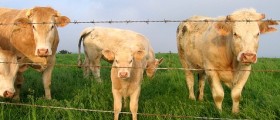
Hormones are chemicals released by glands in human and animal bodies. Hormones are actually body's chemical messengers, which travel around the bloodstream and affect various essential processes. Some of the hormones regulate growth and development, others metabolism, sexual function, reproduction or moods. Hormones have different chemistry and a body works properly only if all of the hormones are in a perfect balance.
Hormones and food production
Hormones used in food production are synthetically obtained, and they are used to make animals get weight faster, and reduce the waiting time and the amount of feed eaten by an animal before slaughter. Other industrially used hormones increase the milk production in cows. The whole point of using hormones in foods is to increase the profitability of food industry, despite all negative effects.
Concerns about hormones in food
Hormones produced by the human body are essential for good health. However, even our body sometimes suffers from hormonal imbalances, caused by various factors. Any kind of change in this balance is associated with various mental and physical illnesses and conditions. Scientific evidence supports the fact that synthetic steroid hormones used as pharmaceutical drugs, increase the risk of cancer. Synthetic estrogen medicine used during the 1960s was banned after it was found to boost the risk of vaginal cancer in daughters of treated women.
What kinds of hormones food industry uses today?
The Food and Drug Administration (FDA) approved six different hormones for use in food industry:
Estradiol and progesterone - natural female sex hormones.Testosterone - natural male sex hormone.Zeranol, trenbolone acetate, and melengestrol acetate - synthetic growth promoters.
The hormones are allowed only for growing cattle and sheep, but not on poultry or hogs. The hormones are introduced into the animals from an ear implant that is put under the skin of the ear. Dairy cattle are sometimes injected under the skin with rbGH, used to increase milk production. This protein hormone is not used on beef cattle. There is no regulatory monitoring of the presence of these hormones in food.
Risks associated with hormones in food
Steroid hormones in food are suspected to cause early puberty in girls, which is strongly associated with a higher risk of breast cancer. Steroid hormone residues from meat are suspected to cause breast enlargement in very young girls and boys. There is still no scientific evidence to support the speculations that eating meat from hormone-treated animals increases one’s risk of breast cancer. The same accounts for drinking milk or eating other dairy products from hormone treated animals.

















Your thoughts on this
Loading...